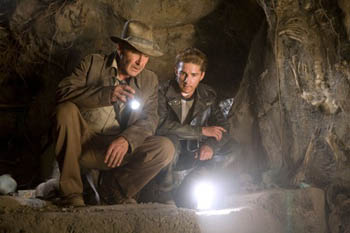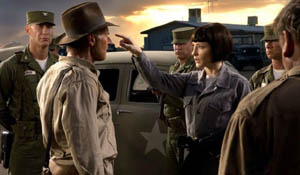|
Well, it only took them nineteen years to finally get around to this film and make Last Crusade no longer the last adventure of one of American cinema's most iconic modern heroes. The rumor of a new Indiana Jones film had been skulking around for a decade or more before the production at last began, and the reason given for the extreme delay in its commencement, that Speilberg really disliked the story, didn't exactly assuage audience concerns. Now that it's finally here, what can we say about the likely final outing of good ole' Indy? For the impatient, I'll jump to the short answer: Is it as good as Raiders of the Lost Ark? No. Is it as good as either of the other two Jones films? Yes, certainly. 
Wisely choosing not to pretend that less time had passed in Indy's world than had done so in the real one, Crystal Skull picks up in the fifties, with the Cold War and McCarthyism in full flower, along with the average citizen's growing fascination with UFOs and alien invasion stories. In an era with such multiple paranioas, it's hardly surprising that the pulp fiction of the day often focused on the fear of the unfeeling Other, an invading force with a frequent lack of individual personalities. The trend for little green men to represent a collective society or even consciousness (a cliché of the genre that persists to this day) was a manifestation of anti-Red sentiment writ large, Communism taken to its hyperbolic extreme. Why am I mentioning all of this? See the film, if you haven't already, and find out. Of all four, this film is the most distinctly keyed in to its particular time, but that doesn't mean the film is message-heavy. Indiana Jones films have always been about fun, and that fact hasn't been forgotten by creators Lucas and Speilberg, an interesting creative duo consisting of a man who's perpetually bitched at for this or that and a man who's perpetually forgiven despite having made more weak films than the other. Jones himself is fun for the simple reason that he's the embodiment of an utterly unpretentious hero concept, one who, despite eventually winning and always getting back on his feet, does tend to get his ass beaten and be made the butt of jokes along the way. His advancing age is a new source of humor in this outing, but fortunately not to a one-note excess. Though he still can hold his own in a fistfight, the stunts are fewer for our hero this time, and new sidekick "Mutt" Williams now gets the bulk of the derring-do. Also greatly welcomed (or welcomed back) to the cast is original and best Indy girl Karen Allen, reprising the role of Marion Ravenwood, a great combination of companion and foil that works just as well now as it did back in '81. Cate Blanchett plays Irirna Spalko, a swashbuckling Commie psychic researcher (and they really did put money into that kind of thing during the Cold War, their side and ours alike) determined to discover the secret of the titular skull and thus acheive the goal of total world domination. As Jones villains go, she's the best since Belloq, and great fun on a screen already full of great fun. Speilberg hasn't forgotten how to direct in the same style as the original trilogy, and there's a minimun of modern-style CG effects, though the ones that are present are quite convincing and don't stick out. The choice is neither here nor there in an absolute sense; people seem to go on as if they believe that films are made by single individuals who choose either to spend their time making computer effects or writing the script, but it certainly provides a familiar and nostolgic feel to the newest installment, which, despite Harrison Ford's age, feels right at home with the preceding Jones movies.  Where things don't quite work are in sporadic doses here and there: there's a cryptographic riddle Indy finds that seems to promise some interesting developments but which actually doesn't end up mattering all that much, and the riddle's author, John Hurt as Professor Oxley, is a somewhat missed opportunity as a character. And the fact remains that none of the films have managed to have an ending as awesome as the first, a climax which gains my suspension of disbelief effortlessly despite the fact that I couldn't remotely believe in it in real life. But I'm already running dry on strokes for the negative column, and it's for the simple reason that I had a damned good time watching this film. The over-the-top action, the simple but effective character drama, the half-spoken references to unspecified adventures Indy had as a colonel in WWII, and the dashes of American Grafitti show a pair of filmmakers having a real blast doing what they're doing, and the enthusiasm is contagious. They even manage to work in a theme about the value of knowledge without it coming off as preachy (mostly by exploiting it as a source for more humor), and hell, in a day when most people can't seem to spell words we teach to seven year-olds, I'm hardly going to complain. One might also wonder how Dr. Jones manages to remain objective and skeptical after half the things he's found turn out to be magical, but I'll hardly complain about an advocacy of skepticism, either. -review by Matt Murray
|
|
||||||||